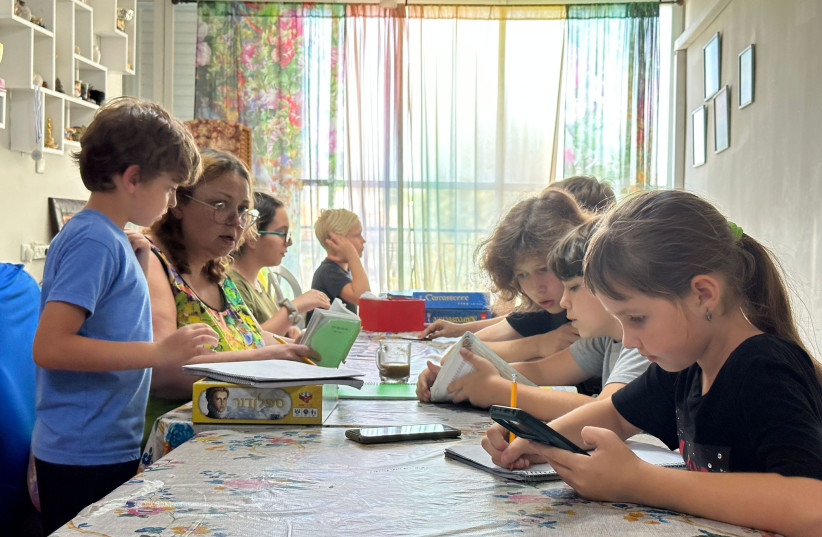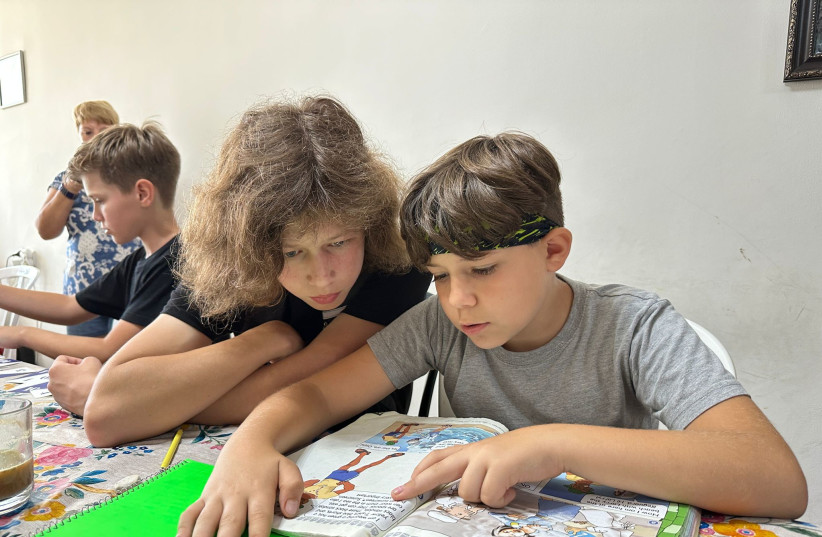Russian-speaking Israelis face divide around war in Ukraine
Tens of thousands of Russians and Ukrainians have moved to Israel since Russia invaded Ukraine in February 2022. Many of the Ukrainian immigrants are war refugees, mostly women, and children, while many Russian immigrants are dissidents opposed to the war and men intent on avoiding service in the Russian army.
Feodor Aliadov, a Russian lawyer of Jewish descent, was an opposition activist even before the war broke out. He had been arrested by Russian forces several times, but after landing a 15-day jail sentence for participating in a peace rally, he decided it was time to leave Russia, he told The Media Line.
Aliadov was able to obtain Israeli citizenship thanks to Israel’s Law of Return, which allows any Jew or person with at least one Jewish grandparent to become an Israeli citizen. By moving to Israel, he avoided forced conscription into the Russian army.
Since the fall of communism, Israel has been home to the largest Russian-speaking community outside the borders of the former Soviet Union. Russian speakers currently account for about 15% of Israel’s nearly 10 million citizens.
The conflict between Ukraine and Russia has been ongoing since 2014, with a serious intensification after the 2022 invasion. In addition to the tens of thousands of civilian and military casualties, a less obvious victim of the conflict is the cohesion of Israel’s Russian-speaking community. The community has split along political lines between those loyal to Putin and supporters of Ukraine.
 7-year-old Oksana (R) and other Russian and Ukrainian children are cared for in Lena Dubrovin’s home, June 21, 2023. (credit: DARIO SANCHEZ/THE MEDIA LINE)
7-year-old Oksana (R) and other Russian and Ukrainian children are cared for in Lena Dubrovin’s home, June 21, 2023. (credit: DARIO SANCHEZ/THE MEDIA LINE)“Relations between the two communities became strained, sometimes violent,” Nataly German, an Israeli nurse of Ukrainian descent, told The Media Line. “We learned, in our daily lives, to avoid arguments that can escalate into violence.”
German is no stranger to potentially controversial arguments. Since the beginning of the war, she has posted pro-Ukraine TikTok videos aimed at Russian-speaking Israelis. Many Russian-born Israelis use TikTok to promote and justify the war in Ukraine, she explained.
“They hate Ukrainians living here in Israel,” she said. “They hate refugees and anyone from Ukraine.”
In response to her videos, German has received multiple anonymous death threats from people claiming to know where she lives and works.
Russian Israelis are unwitting victims of Russian propaganda – Zharova
Anna Zharova, co-founder of the Israeli Friends of Ukraine organization, told The Media Line that many Russian Israelis are unwitting victims of Russian propaganda. This is especially true of older immigrants who arrived in the early 1990s, she said, many of whom have not integrated into Israeli society and rely on Russian-language channels for news.
Zharova noted that many younger Russian Israelis or Russians who have arrived more recently are sympathetic to the Ukrainian narrative. Younger Russian Israelis are known to participate in the anti-war demonstrations periodically held near the Russian Embassy in Tel Aviv, she said.
 A Ukrainian refugee (R) gets help with his homework from a young Israeli volunteer, June 21, 2023. (credit: DARIO SANCHEZ/THE MEDIA LINE)
A Ukrainian refugee (R) gets help with his homework from a young Israeli volunteer, June 21, 2023. (credit: DARIO SANCHEZ/THE MEDIA LINE)Israelis who support Ukraine—be they Ukrainian war refugees, less recent Ukrainian immigrants, or supportive Russian Israelis—are frustrated by Jerusalem’s lack of military support for Kyiv and refusal to take a clear position in the conflict.
The lack of Israeli support was especially jarring for Zharova following Russia’s destruction of a dam in the occupied Ukrainian city of Nova Kakhovka earlier this month. The destruction, which is widely believed to have been intentional, led to flooding that killed at least 52 people and displaced more than 11,000.
“Whenever there has been some disaster, Israel has always sent aid to the population, while for Nova Kakhovka and its region, nothing has been done,” Zharova said. “We have repeatedly asked for an official reaction from the government, which there has been none.”
Even among Ukrainian Israelis, feelings about the war are varied. Natalya Rysieva, who fled the Donbas region of Ukraine in 2017 and is now a shopkeeper in Bat Yam, just south of Tel Aviv, told The Media Line that she feels victimized by Kyiv as well as Moscow.
Russian-speaking separatists in the Donbas, backed by Moscow, have been waging an insurgency against Ukraine since 2014. Russian President Vladimir Putin has used the conflict in the Donbas to justify the ongoing invasion of Ukraine, arguing that Russia has a humanitarian imperative to protect Russian speakers from repression.
“The Donbas was the richest region in Ukraine and only wanted more autonomy from the central government,” Rysieva said. “However, there was no reason on the Russian side to start a war. No one was cheering in that sense.”
Jewish immigration from the countries of the former Soviet Union has been ongoing throughout the war, despite political, logistical, and bureaucratic difficulties. In some cases, would-be immigrants were extracted from areas close to the war’s front lines.
Together with the Israeli education system, Israel’s Interior Ministry and the semi-governmental Jewish Agency for Israel are now focused on helping new immigrants integrate and on reducing discord among immigrants from different backgrounds.
Sofy Miniev, a Hebrew teacher of Russian origin, has Ukrainian, Russian, and Belarusian students in her Hebrew classes. She told The Media Line that relations between students of different backgrounds are strong, in part due to a reminder at the beginning of the course to leave politics out of the classroom.
In addition to immigrants with Jewish backgrounds, between 14,000 and 15,000 non-Jewish Ukrainian war refugees have entered Israel using tourist visas. In an apparent attempt to avoid friction with Moscow amid an all-time low in Israel-Russia relations, Jerusalem has not granted these immigrants official refugee status but has given them the status of “humanitarian tourists.” The status prevents the immigrants from working legally in the country but guarantees basic health care and education for children.
Israel’s resistance to upsetting Russia has to do with Russia’s presence in Syria and military cooperation with Iran. For Jerusalem, maintaining an open channel of communication with Moscow is a matter of national security. But for the Ukrainians staying in Israel on indefinite tourist visas, the situation is untenable, Lena Dubrovin, a volunteer who works with refugees, told The Media Line.
Dubrovin provides food, money, medicine, and shelter to dozens of Ukrainian women and children who have not received Israeli citizenship.
“That was supposed to last, it was thought, only a few weeks, and instead has been going on—without any support from the state—for over a year and a half,” she said.
Lena’s apartment has been a home to numerous refugees, including Oksana, a 7-year-old who came to Israel with her mother from a small town in the Kyiv region, leaving behind her father and brother to fight against the Russian army.
At the St. Petersburg International Economic Forum earlier this month, Putin made disparaging comments about Ukrainian President Volodymyr Zelenskyy’s Jewish status. “My Jewish friends say that Zelenskyy is not a Jew, but a shame to the Jewish people,” he said.
That comment, together with a perceived rise of antisemitism in Russia, has led Aliadov and other Russian-speaking Israelis to fear that Moscow may put an end to Jewish emigration from Russia.
“There are several reasons why I’m afraid for my parents in Russia,” Aliadov said. “The first one is that aliyah [Jewish immigration to Israel] can be stopped by the Russian government, and the second one is that the antisemitism in Russia is rising from year to year.”
If Russia were indeed to stop Jewish emigration, the decision would have serious consequences for the estimated tens of thousands of Jews remaining in Russia, who would no longer be able to escape the war.





Comments are closed.